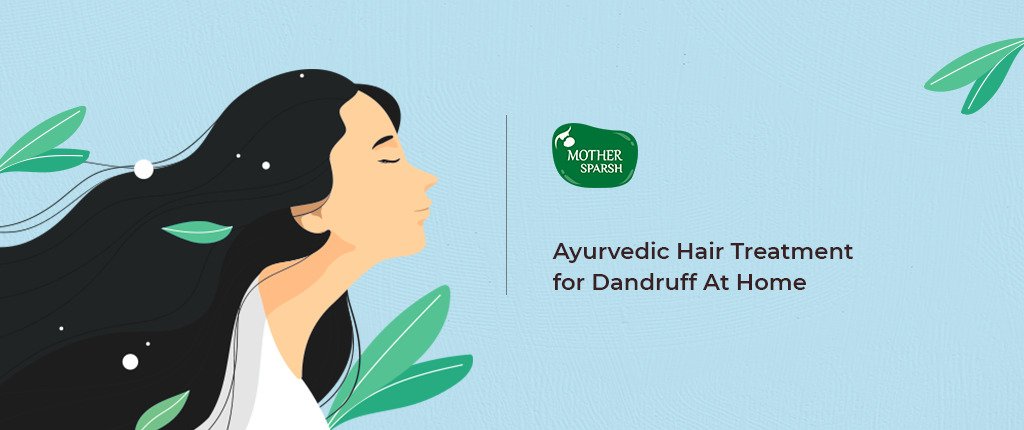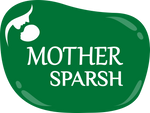
Ayurvedic Hair Treatment for Dandruff At Home
What is your definition of healthy hair? Ours is dandruff-free lusciously growing hair with a proper balance between hair fall and growth. And our path to that healthy hair is Ayurvedic Hair Treatment!

Of all the hair problems one could have, dandruff is the most irritating(literally and figuratively). May it be the white flaky dandruff during winters or oily dandruff that comes with summers, it takes a toll on our hair health.
This blog gives you an insight on how to treat dandruff at home and what are the best ayurvedic products for dandruff. So, keep reading!
Benefits of Ayurvedic Hair Treatment for Dandruff
Flaky white dandruff on your scalp can be due to scalp sensitivity, oil accumulation on the scalp or scalp conditions. Whatever your reason is, the best way to cure and prevent dandruff is through Ayurvedic Hair Treatments.
People with dry skin have more chances of getting flaky dandruff while people with oily skin might have greasy dandruff. Studies have pointed out that skin allergies can be a reason for dandruff; the sudden appearance of dandruff on the scalp can be a part of an allergic reaction. A thorough medical check-up will help you identify if it is an allergic reaction or any skin condition such as seborrheic.

Dandruff, when left untreated, can cause several other hair problems like hair fall and poor hair growth. The side effects do not end there; pimples, back acne, and psoriasis are other problems that come with dandruff. Ensuring proper hair hygiene, using the right hair care products, and following ayurvedic hair treatments are vital for keeping dandruff at bay.
Ingredients Ideal for Hair Health
● Ginger:
Ginger is a promising antimicrobial agent that helps cure dandruff and other fungal infections. It is also a potential source of magnesium, potassium, phosphorus, and vitamins facilitating hair growth. Due to its healing properties, ginger has been used in hair oils and leps for years now.

You can use ginger powder with soothing ingredients as a lep on your scalp. Other options are using ginger juice to wash hair and making oil with ginger paste.
● Neem:
Neem is a great anti-microbial and anti-inflammatory agent; it also has properties to purify the blood and keep dandruff away. This leaf is a potential source of fatty acids, vitamin E, limonoids, and antioxidants. So, wonder no more why neem is a prominent ingredient of ayurvedic oils and hair shampoo for dandruff.
Using neem water to wash hair will reduce itchiness and irritation due to dandruff. For permanent relief, powder neem leaves and use it as a lep regularly.
● Methi:
Methi is rich in vitamins A, B, and C, antioxidants, iron and protein; it also has anti-inflammatory, anti-bacterial, and anti-fungal properties. Methi paste moisturises the scalp, maintains oil balance, prevents dandruff and keeps the scalp hygienic.
Soak methi seed overnight, make a paste and apply it to your scalp as a hair mask for relief from flaky dandruff. You can also use methi infused hair lep or hair oils to cure dandruff.
● Baheda:
Baheda, also known as Bibhitaki, is enriched with vital nutrients and minerals necessary for hair growth. It cleanses the scalp by removing excess oil, maintaining oil balance and keeping a check on dandruff. The nourishing properties of this fruit make it a must-have ingredient in ayurvedic hair treatment for dandruff.
To apply it on hair, make a paste of Baheda fruit with curd, honey or aloe vera gel; spread it evenly on the scalp and hair and wash it off after 20 minutes. Use this mask twice a week for the best result.
● Chamomile:
Chamomile seed is a promising source of potassium, magnesium, sodium, calcium, riboflavin, iron, and zinc. This nutrient-rich element also is blessed with antiseptic and anti-inflammatory properties. The soothing properties of this herb keep bacteria and fungal infections away from the scalp and reduce inflammation.
Drinking chamomile tea is good to avail the nutrient benefits of this herb. Using chamomile oil is also effective for removing dandruff, soothing the scalp and promoting peaceful sleep.
● Sunflower Oil:
It is well-known that sunflower oil is a good source of vitamin E; however, what we do not know is that sunflower oil is enriched with oleic acid and linoleic acid. These elements have anti-inflammatory properties that help in curing dandruff and itchiness. Sunflower oil is also a natural nourishing agent that softens and smoothes hair.
Use ayurvedic hair oils with sunflower oil as a prime constituent to cure dandruff and improve hair growth.
● Cade Oil:
This oil is derived from the Cade tree and is commonly used in medicines; the calming fragrance makes it a prominent ingredient of perfumes too. It is a natural anti-inflammatory agent that calms itchiness and skin diseases like psoriasis and dandruff. That makes it a vital constituent of anti-dandruff shampoos, hair oils, and masks.
Use hair shampoo for dandruff with cade oil as a significant ingredient to keep dandruff at bay.
● Tea Tree Oil:
Tea tree oil is the powerhouse of medicinal properties and acts as an antimicrobial, antiviral and antibacterial agent. The therapeutic aroma, soothing properties, and natural cleansing effect make it an ideal anti-dandruff agent. It is also known to heal scalp irritation caused by dry skin, contact dermatitis, and scalp inflammation.

Add a few drops of tea tree oil to your regular hair oil and shampoo before applying it to your hair for dandruff control. You can also switch to hair care products with tea tree oil for hassle-free dandruff treatment at home.
● Reetha:
Reetha seeds are traditional hair treatment ingredients with a cumbersome amount of hair growth nutrients. It is a natural antibacterial and antifungal agent and helps prevent dandruff and scalp infection. The cleansing property of Reetha makes it the ideal ingredient for hair shampoo for dandruff.
Soak Reetha seeds overnight, and cook them in plain water in the morning. Once it is cooked and soft, cool it, make a thick paste and use it as a hair mask once or twice every week. Using ayurvedic hair care products with a Reetha blend is also a suggested way to get the benefits of Reetha.




